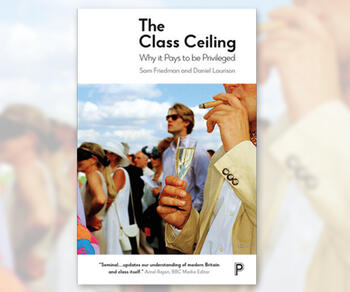
Most of us have stopped believing in the myth of the meritocracy. The myth promises that the ablest or most intelligent or hardest working get ahead of the rest. Most everyone realizes this is not true, yet we continue to act as if it is. We tell our children to stay in school so they can move up, not down, the class ladder. A specific version of that myth is the idea that “anyone can be President” in the United States regardless of accidents of birth like color of skin, geography, or gender. Children are often reminded that Abraham Lincoln was born in a log cabin, as if anyone born in a trailer in Appalachia or an East Los Angeles barrio or public housing in Detroit can follow his route. Such stories imply that those who don’t move up are to blame for failing to “pull themselves up by their bootstraps.”
The insidious myth of meritocracy belies increasingly insane levels of inequality in the US that prevent even younger generations born into the middle class from achieving “the American Dream,” if by that we mean stable housing, secure employment, and the opportunity to do as well or better than one’s parents. Yet we still believe that if you go to the right schools and do well, you can actually pull ahead, no matter where you were born or what you look like. You probably know someone born into poverty who is doing relatively well today – maybe even yourself. But doing better isn’t necessarily actual class advancement. A slew of studies in recent years document the persistence of inequities that keep working-class people from achieving economic and social parity with their peers, even when similarly educated or occupied.
One massive study in the UK found that even when those from working-class backgrounds land prestigious jobs, they earn, on average, 16% less than colleagues from privileged backgrounds. Sociologists Daniel Laurison and Sam Friedman coined the term the class ceiling to describe this phenomenon. Drawing on 175 interviews with individuals from four relatively elite occupations – television, accountancy, architecture, and acting – they uncovered a complex system of barriers to class advancement. Working-class people lack access to the social networks that give some employees an edge over others. They may not be familiar with “the rules of the game” and other cultural expectations. And of course, they also face outright discrimination based on accents and other instances of overt classism. Yet some occupations are less classist than others, which provides some hope that we could, if we had the will, reduce or eliminate many of these barriers.
Political scientist Nic Carnes has identified a similar class gap in political representation. In The Cash Ceiling,he argues that many from working-class backgrounds would be qualified to run for office. Indeed, there are more working-class Americans than middle-class Americans, and there are no educational or occupational requirements for becoming a politician. Furthermore, working-class candidates do just as well as other candidates — when they run. The problem, Carnes finds, is that they can’t run because of practical burdens like taking time off from work, but they are also passed over by political and civic leaders who prefer middle-class candidates. Here again, social networks matter.
My own research demonstrated similar obstacles for low-income, first-generation, working-class college students. Even when they get into selective colleges and do well academically, they fare less well than their more privileged peers. I argued that colleges often amplify pre-existing advantages, rather than ameliorate them. Among many other factors, who you know matters in getting first (and subsequent) jobs, and working-class students simply do not have the same access to social networks as many of their peers.
Read the rest of this piece at Working-Class Perspectives.
Allison L. Hurst is an Associate Professor of Sociology at Oregon State University and the author of two books on the experiences and identity reformations of working-class college students, The Burden of Academic Success: Loyalists, Renegades, and Double Agents (2010) and College and the Working Class (2012). She was one of the founders of the Association of Working-Class Academics, an organization composed of college faculty and staff who were the first in their families to graduate from college, for which she also served as president from 2008 to 2014.













Point Missed
I think the writer completely misses the point. Which is, the relevant comparison is not what a working-class person with a high-paying job earns relative to a middle- or upper-class person with the same job; it is what he earns relative to what he would have earned had he not worked himself into the job in the first place. Relative to that, he has succeeded, and his children will start out in a more "privileged" position than he did and in their turn can rise still more. Class mobility and wealth creation are the work of generations.